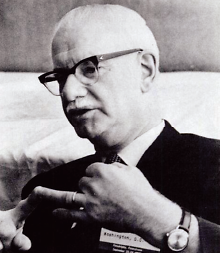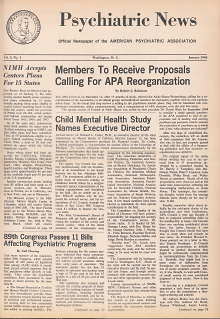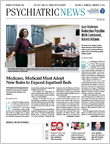The first issue of Psychiatric News 50 years ago this month included a drawing by Fernand Leger in an advertisement for Librium, a plea for a psychiatrist to work in the rural South, and a note about the new Medicare programs that “created new problems” for psychiatry.
A look back reveals not only an era of psychiatry past but some surprisingly current issues within the profession—not to mention any number of curiosities.
“Since its inception,” said current Editor-in-Chief Jeffrey Borenstein, M.D., “Psychiatric News has served our members as an authoritative source of the most up-to-date information on APA and the field of psychiatry. In many ways, a review of the content of Psychiatric News shows the significant progress that psychiatry has made over the past 50 years and the many successful initiatives that APA has undertaken on behalf of our members and patients.”
The tabloid-sized, monthly Psychiatric News replaced the A.P.A. Newsletter, which began printed life as a monthly in June 1948. Its final issue, under editor Robert Robinson, APA’s public information officer, was dated December 1965.
“From an editorial point of view, it has been a modest thing, though very much our own,” wrote Robinson in the newsletter’s epitaph. “But it was brief, it was useful, and it was read. And because it was read, it did much to knit the psychiatric family together. Many will miss it.”
Perhaps. In any case, Robinson became the first editor-in-chief of Psychiatric News under the leadership of Medical Director Walter Barton, M.D., and APA President Howard Rome, M.D. In 1983, the first psychiatrist was appointed editor-in-chief, and the title was held by Robert Campbell III, M.D., (1983-1998), followed by James Krajeski, M.D. (1998-2010), and Borenstein (2012-present).
Unlike the typewritten Newsletter, the new Psychiatric News carried advertising, most prominently for medications with names like Mellaril, Stelazine, Proketazine, Thorazine, Miltown (“Frequently an effective adjunct to psychotherapy”), Librium, Elavil, Tofranil, and Norpramin (“a rapid lift from the hell of depression”). There was also a full-page ad for Norinyl oral contraceptive pills “when psychopathology contraindicates pregnancy. …”
The lead article in the January 1966 issue reported on a set of 31 suggestions for reorganizing APA—a recurrent theme over the decades. The most prominent goal was transforming APA’s ruling body from a Council to a Board of Trustees, one that would include representatives from the six Areas of the Assembly of District Branches.
Reimbursement for services was another perennial matter. The paper reported on insurance guidelines developed at APA headquarters late in 1965, occasioned by a United Auto Workers collective bargaining agreement that covered mental disorders, and the advent of Medicare, which “created new problems by eliminating most of the discrimination against those with mental disorders.” No explanation was offered about what the new problems might be.
In another story, a nationwide study of 16,454 psychiatrists and residents found that just 54 percent said they spent time in private practice, “in contrast to the prevailing belief that the great majority of psychiatrists spend substantially all of their time in private office practice.” Many psychiatrists worked at least part time for federal, state, or local government entities. Half of all respondents lived in just five states: New York, California, Pennsylvania, Massachusetts, and Illinois. Overall, the 10 states with the most psychiatrists accounted for two-thirds of all respondents in the survey.
Rural America called out from the classified ad section. There, the Homochitto Valley Medical Association in Mississippi offered an “Absolutely free-midwinter or spring combination vacation and scouting trip for psychiatry resident completing his training in July of this year. Trip includes air travel from anywhere in the continental United States, round trip, four days of food and lodging, and tour of the antebellum homes in the Natchez, Miss., area.”
The “ulterior motive,” continued the ad, “is that the Homochitto Valley Medical Association is deeply committed to obtaining a psychiatrist for the Natchez-Adams County area.” The ad is a reminder that, half a century later, rural areas still have difficulty attracting and retaining psychiatrists.
In other news, the Joint Commission on Accreditation of Hospitals said it would expedite its review of unaccredited psychiatric hospitals and general hospitals providing psychiatric care to help them qualify for participation in the Medicare program. At the time, about 60 percent of mental hospitals were not accredited, according to Hugh Carmichael, the commission’s spokesperson for psychiatric hospitals.
A column by editor-in-chief Robinson reported on the apparent resolution of a war of words between Democratic U.S. Sen. Robert Kennedy and Republican Gov. Nelson Rockefeller over New York State’s facilities for children with mental illness and “mental retardation.”
The senator complained about “children slipping into blankness … in rooms less comfortable and cheerful than the cages in which we put animals in the zoo. …” The state’s Department of Mental Hygiene, on behalf of the governor, noted his awareness of “difficulties faced by the state schools as a result of the overcrowding and understaffing. …”
Robinson lauded the state’s “efficient public relations facility,” which responded artfully to Sen. Kennedy’s remarks and led the two officials “to instill a collective sense of responsibility among the citizenry to remedy an inexcusable social deficiency.”
And in one brief paragraph, tucked away in a section called “Briefly Noted,” was this reflection of the 1960s:
“Drs. Charles Dahlberg, Stanley Feldstein, and Joseph Jaffe, of New York City have been awarded a three-year, $166,000 grant from NIMH to study the effect of LSD-25 upon ongoing therapeutic interaction.”
Their research resulted in several papers on the effects of LSD on the use of language by patients in psychoanalysis, recalled New York psychotherapist Ruth Mechaneck, Ph.D., a fellow researcher and co-author with the three psychiatrists.
“We were the last approved study using LSD at that time,” said Mechaneck in a recent interview. “We collected reams of tapes, looking for language performance and disconnections. There was a wealth of data, and a lot more could have been retrieved from that work.”
The times, they were a’changing, though. In 1968, Mechaneck, Dahlberg, and Feldstein reported in the American Journal of Psychiatry on the “negative effects upon certain aspects of research with the drug” caused by the “adverse publicity associated with LSD.”
Over the course of the coming year, more articles in Psychiatric News will look back through the newspaper’s past to illuminate just how far psychiatry has traveled in the last half century. ■



